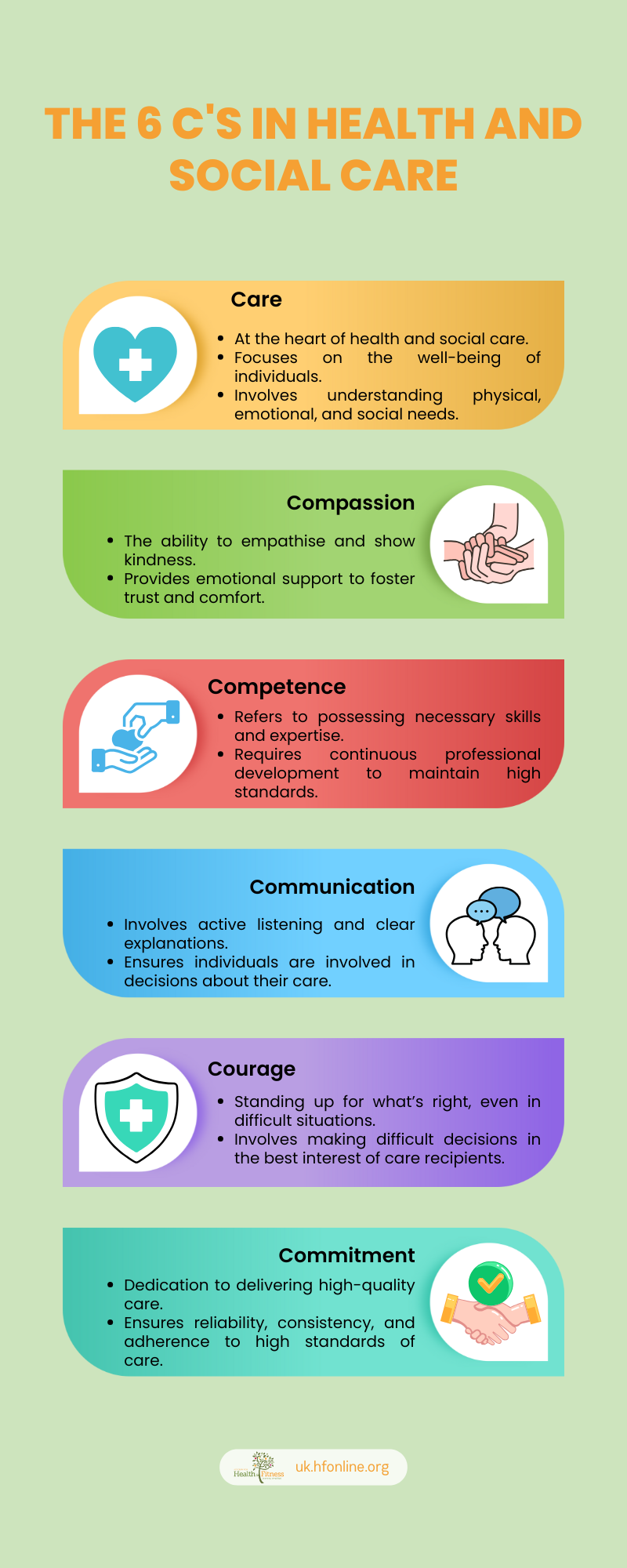In health social care, quality service provision is paramount. It is not sufficient to only provide medical assistance. It also includes providing effective, efficient, and considerate assistance that can greatly improve a person’s health. With the increase in demand for quality care services in the UK, especially with the aging population, it is imperative that healthcare service providers adhere to a certain set of values that ensure every human being is provided with the care that they deserve. This is where the 6 C’s of health and social care come into play—a guiding framework that underpins best practices in the industry. But what exactly are these 6 C’s, and why are they so important in shaping the future of care? Let’s explore how these values are transforming the delivery of health and social care.
1. What is social care?
Social care is a comprehensive field that involves a wide array of services aimed at supporting individuals who require assistance with day-to-day activities. These services are crucial for people facing challenges due to disabilities, mental health conditions, chronic illnesses, or the natural ageing process. The goal of social care is not only to provide practical support but also to enhance the overall quality of life for those in need, helping them maintain their independence and dignity.
Social care services may include helping clients with personal care activities such as oral hygiene, washing, grooming and taking of medications. It also involves psychological care, engaging clients in socialisation, as well as ensuring their community access. Whether it is in home care, in nursing and assisted living facilities or other social programs, social care is about providing individuals with a supportive, considerate, and encouraging atmosphere that maximises their independence.
2. What are the 6 C’s in social and health care?

The 6 Cs are a comprehensive framework used to assess the quality of care provided in health and social care settings. They provide a set of standards that ensure individuals receive compassionate, effective, and respectful support.
Care
Care is at the heart of health and social work, focussing on the well-being of individuals. It means understanding and addressing the physical, emotional, and social needs of each person, ensuring that they receive respectful and personalised attention.
Compassion
Compassion is the ability to empathise with individuals, to show kindness and understanding. It involves being emotionally aware of their feelings and experiences, offering emotional support to create a trusting and comforting environment.
Competence
Competence refers to having the necessary skills, knowledge, and expertise to provide safe, effective care. It requires continuous professional development to stay up to date with best practices, ensuring high standards of care.
Communication
Effective communication is crucial in building relationships and trust. It means listening carefully, explaining information clearly, and involving individuals in decisions about their care, ensuring they feel heard and respected.
Courage
Courage involves standing up for what is right, even in challenging situations. It means being brave enough to speak out about concerns, advocate for individuals, and make decisions that might be difficult but are in the best interest of those in care.
Commitment
Commitment refers to the dedication to providing high-quality care and making a positive difference in individuals’ lives. It includes being reliable, consistent, and focused on delivering care that meets the highest standards.
By focussing on these 6 Cs, healthcare professionals can ensure that individuals receive the highest quality of care.
3. What Care Settings Do They Apply To?
The 6 Cs are applicable across various care settings, helping to ensure that care is consistently delivered with compassion, competence, and a strong commitment to high standards. Here’s how they are relevant to different care environments:
Hospitals
The 6 Cs guide the delivery of patient-centred care, ensuring that hospital staff provide compassionate and competent care, communicate effectively with patients and their families, and uphold high standards of practice.
Nursing Homes
In residential care settings, the 6 Cs help in creating a supportive and respectful environment for elderly residents, emphasising empathy, effective communication, and commitment to their well-being.
Community Health Services
For services like home care and community nursing, the 6 Cs are crucial for maintaining high-quality care, fostering strong relationships with patients, and addressing their needs with competence and compassion.
Mental Health Services
The principles of the 6 Cs are essential in mental health settings, where understanding, effective communication, and courage are needed to support individuals facing mental health challenges.
Primary Care
General practitioners and other primary care providers use the 6 Cs to ensure that their interactions with patients are empathetic, informed, and respectful, enhancing the overall patient experience.
Palliative and End-of-Life Care
The 6 Cs are vital in palliative care settings, where providing compassionate, respectful, and competent care is crucial for supporting individuals and their families through end-of-life challenges.
Childcare Services
In settings such as nurseries and schools, the 6 Cs guide staff in delivering care that is sensitive to the needs of children, involving clear communication with parents, and showing commitment to the children’s development and well-being.
Learning Disabilities Services
The 6 Cs ensure that care for individuals with learning disabilities is respectful, empathetic, and tailored to their specific needs, promoting a supportive and inclusive environment.
4. How do the 6 C’s affect care providers?

The 6 Cs significantly impact care providers by shaping how they deliver and improve care. These principles ensure that care providers prioritise patients’ needs, demonstrate empathy, and maintain high levels of skill and knowledge. They promote clear communication, fostering trust and collaboration with patients and colleagues. By encouraging courageous decision-making and steadfast dedication to quality care, the 6 Cs help providers advocate for patients effectively, manage complex situations, and continually enhance their professional development. Ultimately, adhering to these values leads to better patient outcomes, greater satisfaction, and a more fulfilling and effective care experience.
5. The 6 C’s in Action
Imagine a patient with a chronic illness is feeling overwhelmed and isolated. The healthcare professional assigned to their case demonstrates compassion by listening attentively to their concerns and validating their feelings. They use clear and concise communication to explain the treatment plan and answer the patient’s questions. The professional’s competence is evident in their knowledge of the condition and ability to provide effective care. They show courage by advocating for the patient’s needs and challenging systems that may be hindering their progress. Their commitment to providing the best possible care is demonstrated through their reliability and dedication. Finally, their caring nature is evident in their genuine concern for the patient’s well-being.
6. Which of the 6 C’s is most important?
Imagine a patient with a chronic illness is feeling overwhelmed and isolated. The healthcare professional assigned to their case demonstrates compassion by listening attentively to their concerns and validating their feelings. They use clear and concise communication to explain the treatment plan and answer the patient’s questions. The professional’s competence is evident in their knowledge of the condition and ability to provide effective care. They show courage by advocating for the patient’s needs and challenging systems that may be hindering their progress. Their commitment to providing the best possible care is demonstrated through their reliability and dedication. Finally, their caring nature is evident in their genuine concern for the patient’s well-being.
7. FAQs
1. What are the 6 C’s in health and social care?
The 6 C’s are a set of core values that guide healthcare professionals in delivering high-quality care. They include Care, Compassion, Competence, Communication, Courage, and Commitment.
2. Why are the 6 C’s important in health and social care?
The 6 C’s ensure that healthcare professionals provide compassionate, patient-centred care that prioritises respect, skill, and clear communication, ultimately leading to better patient outcomes.
3. How do the 6 C’s impact care providers?
The 6 C’s guide care providers in maintaining a high standard of care, fostering empathy, effective communication, and professional competence. They encourage courageous decision-making and dedication to improving patient well-being.
4. What is the most important C among the 6 C’s?
Compassion is often considered the most important C because it fosters trust and rapport, creating a patient-centred care environment that improves overall outcomes and satisfaction.
5. How do the 6 C’s apply to different care settings?
The 6 C’s are applicable in hospitals, nursing homes, community health services, mental health services, primary care, palliative care, childcare services, and services for individuals with learning disabilities.
8. Final Words
The 6 Cs provide a comprehensive framework for ensuring that individuals receive the highest quality of care in all health and social care settings. By focussing on compassion, competence, communication, courage, commitment, and caring, healthcare professionals can create a supportive and respectful environment that fosters trust, improves patient outcomes, and enhances the overall quality of life.

















